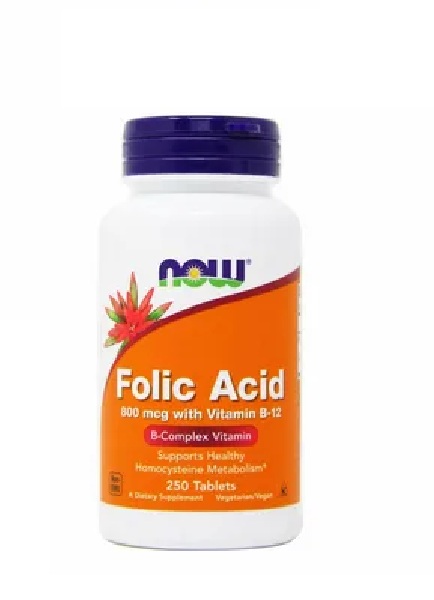Folate, also known as folic acid in its synthetic form, is a water-soluble B vitamin essential for numerous physiological functions in the body. It plays a crucial role in DNA synthesis, cell division, and the formation of red blood cells. Folate is particularly important during periods of rapid growth and development, such as pregnancy and infancy, as well as for overall health and well-being throughout life. While folate is naturally found in various foods, including leafy green vegetables, legumes, and citrus fruits, supplementation may be necessary to ensure adequate intake, especially for certain populations at risk of deficiency. This comprehensive guide explores the extensive benefits of folate supplements, covering their mechanisms of action, scientific evidence, and practical considerations for those interested in incorporating them into their health regimen.
Mechanisms of Action
Folate plays a crucial role in numerous biological processes within the body, making it essential for overall health and well-being. As a coenzyme, folate is involved in the synthesis of DNA and RNA, the building blocks of genetic material. It also participates in the methylation cycle, where it helps convert homocysteine, an amino acid, into methionine, a process critical for DNA methylation and gene expression regulation. Additionally, folate is necessary for the formation of red blood cells and the metabolism of certain amino acids and neurotransmitters. Folate supplements provide a concentrated source of this vital nutrient, ensuring that the body has an adequate supply to support its physiological functions.
Pregnancy and Fetal Development
One of the most well-known benefits of folate supplements is their role in preventing neural tube defects (NTDs) in newborns. Adequate folate intake, particularly during the periconceptional period (before and during early pregnancy), is essential for preventing abnormalities in the development of the neural tube, which gives rise to the brain and spinal cord. Folate supplementation has been shown to significantly reduce the risk of NTDs, such as spina bifida and anencephaly, when taken before and during pregnancy. For this reason, healthcare professionals recommend that women of childbearing age consume adequate amounts of folate, either through diet or supplementation, to support optimal fetal development and reduce the risk of birth defects.
Heart Health
Folate supplements may offer benefits for heart health by helping to reduce levels of homocysteine, an amino acid associated with an increased risk of cardiovascular disease. Elevated homocysteine levels have been linked to a higher risk of coronary artery disease, stroke, and other cardiovascular conditions. Folate plays a key role in the conversion of homocysteine to methionine, a process that helps maintain homocysteine levels within a healthy range. Studies have shown that folate supplementation can lower homocysteine levels, particularly in individuals with elevated levels or at risk of cardiovascular disease. While more research is needed to determine the impact of folate supplementation on cardiovascular outcomes, evidence suggests that it may have potential as part of a comprehensive approach to heart health.
Mental Health and Cognitive Function
Folate supplements may also support mental health and cognitive function by contributing to the production of neurotransmitters such as serotonin, dopamine, and norepinephrine. These neurotransmitters play a crucial role in mood regulation, stress response, and cognitive function. Folate deficiency has been associated with an increased risk of depression, anxiety, and cognitive decline, particularly in older adults. Folate supplementation has been shown to improve symptoms of depression and enhance cognitive function in some individuals, although results have been mixed. Further research is needed to better understand the relationship between folate status and mental health outcomes and to determine the effectiveness of folate supplementation in specific populations.
Practical Considerations and How to Take Folate Supplements
Folate supplements are available in various forms, including folic acid (the synthetic form) and methylfolate (the active, bioavailable form). The appropriate dosage of folate supplements may vary depending on individual health needs, age, and specific requirements. For most adults, the recommended daily intake of folate is 400 micrograms (mcg) per day, although higher doses may be recommended for certain populations, such as pregnant women or individuals with specific health conditions. It’s essential to follow the recommended dosages provided by healthcare professionals or supplement manufacturers to ensure safety and efficacy.
While folate supplements are generally considered safe for most individuals when taken as directed, some people may experience side effects such as gastrointestinal upset or allergic reactions. Pregnant and breastfeeding women, individuals with certain medical conditions (such as epilepsy or kidney disease), and those taking medications should consult with a healthcare professional before using folate supplements. Additionally, folate supplements may interact with certain medications, such as anticonvulsants, methotrexate, and certain antibiotics, so it’s important to seek medical advice before starting supplementation.
Conclusion
Folate supplements offer a wide range of potential health benefits, including support for pregnancy and fetal development, heart health, mental health, and cognitive function. With their crucial role in numerous physiological processes within the body, folate supplements stand as a valuable option for individuals seeking to support overall health and well-being. By incorporating folate supplements into their health regimen, individuals can ensure adequate intake of this essential nutrient, particularly during periods of increased need, such as pregnancy or times of stress. However, it’s essential to use folate supplements responsibly and in conjunction with a balanced diet and lifestyle to maximize their effectiveness and ensure optimal health outcomes.
- Juicy Adventures: A THC Beverage Review with Melo’s Grapefruit vs. Wild Berries - May 20, 2024
- Comprehensive Analysis The Ultimate CBD Topical Unveiled By Empe-USA - April 10, 2024
- Benefits of Folate (Folic Acid) Supplements - April 2, 2024

